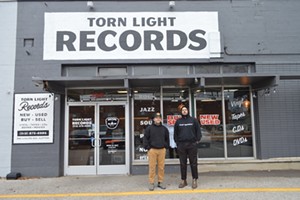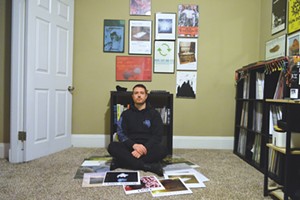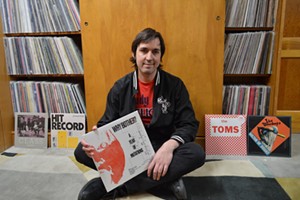click to enlarge
Photo: Mitch LaGrow
Terry Cole of Colemine Records
This story is featured in CityBeat’s Jan. 24 print edition.
Cincinnati’s music landscape has always been diverse and lively. Various local musicians, singers, venues, recording studios, record labels and record stores among other cogs of the music industry have cultivated a rich music scene that impacts culture on local, national and international levels.
Have you ever listened to the Black Pumas, the Monophonics or seen a show at a local venue like DSGN CLLCTV or MOTR Pub? Thumbed through the vinyl collection at Torn Light Records or found a zine written by a local artist among the store’s variety of books? Have you ever seen a local band play live and discover an out-of-town act on the bill? Craved a re-issue of an album from another era that touches you with nostalgia?
Music culture is defined by these experiences, but who’s responsible for their curation?
Cincinnati is home to record labels illustrative of these multifaceted operations, four of which embody the scope of what it takes to successfully run a label while representing different outlooks on management styles and today’s music industry: Colemine Records, Torn Light Records, Feel It Records and Whited Sepulchre Records.
The major players
Colemine Records in Loveland keeps soul alive, its subsidiary label signed the Grammy-nominated Black Pumas in 2018 before the band signed with their current affiliation, ATO Records. Colemine’s releases can be found in record stores across the nation.
Ryan Hall, owner of Whited Sepulchre Records, books handfuls of shows per month at local venues and specializes in discovering experimental music.
Feel It Records owner Sam Richardson relocated his business to Cincinnati two years ago. As the label operator and guitarist for local rock band BEEF, Richardson has a hand in bringing out-of-town musicians from the label and beyond to local venues.
Colemine Records’ affiliated store Plaid Room Records is stocked with hand-picked merchandise, not unlike Torn Light Records, which also originated in Cincinnati. Torn Light’s label and storefront specialized in bringing live music and carefully curated, sometimes rare records to town for 10 years until its last day in Cincinnati on Jan. 13. The operation is relocating to Chicago.
The Queen City has fostered legends that span generations, like James Brown, Bootsy Collins, The National, Doris Day, The Deele, The Isley Brothers, Over the Rhine, Foxy Shazam, Nick Lachey and Otis Williams and the Charms. Cincinnati’s brimming music scene is partly molded by what could be considered the unsung heroes of the music industry: independent record labels.
“I think [Cincinnati] is a fucking awesome place to run stuff,” Terry Cole, co-owner of Colemine Records, tells CityBeat. “And there’s a super rich history. When people come from out of town and go to all the record stores in Cincinnati, they’re blown away. I’ve been to hundreds of record stores around the country and I don’t think there are any other markets that can hold a candle to Cincinnati. You have two stores in Cincinnati that have all the major label accounts, that’s us (Colemine) and Shake It Records. We’re in Loveland, Ohio, making solo music for the most part, and nobody [in the industry] gives a shit. It’s really nice. It allows us to operate truly, honestly and independently, independent of outside influence.”
In its simplest form – independent or not – the job of a record label is to promote and sell an artist’s music, develop artists and coordinate the steps it takes to present a body of work in final form. Industry giants with label-group funding like Atlantic Records or Interscope Records dictate what’s on the radio. Major labels are big business; they control trending songs and artists and often function by promoting art that will make money, while indie labels are founded on a labor of love basis.
Major labels might tell the masses what to listen to, but indie labels source movements by discovering fresh sounds, novel artists and igniting grassroots interest.
To be successful, indie labels typically have to branch out beyond the simple format of representing and promoting an artist. Along with curating a cohesive collection of music and establishing a brand for themselves, independent labels often offer services like marketing, studio recording, album artwork, distribution, mastering and mixing tracks for various formats, public relations and artist touring details.
These independent labels function based on their owners’ and employees’ specific tastes and business models; they work with artists intimately and carefully handle the music while deciding the best route for getting it in front of the right listener. Each label has its own flavor, producing music from experimental to hip-hop and obscure noise to mainstream soul and punk to rock and roll, accounting for countless genres in between.
“I think there are some [artists] that genuinely just want to be part of a family-style operation where things are a little more natural, but you still get that like, infrastructure of working with a label that understands how to get your music out there, how to tastefully promote it,” Richardson of Feel It Records says. “I think a lot of people just want to focus on being a songwriter or touring, and just being creative. Because if you’re going to be a full time musician, you’d be hard pressed to have the time to also do the label side of it.”
Just because the labels are based in Cincinnati doesn’t mean they only represent local talent, and it also doesn’t mean they originated here or will stay forever. Longtime Cincinnati record store and label Torn Light Records – known for a DIY ethos and storefront in Clifton – announced in November that the business is relocating to Chicago.
Releases from each of the labels’ catalogs have reached audiences nationally, if not internationally. A lot of their successes come from mutual support and shared resources like warehouse space, distribution avenues and marketing. Label owners tell CityBeat that the only competition is friendly and agree that having an abundance of labels and stores only adds to Cincinnati’s already dynamic music culture.
This month, Richardson announced that Feel It Records will be moving into Torn Light’s Ludlow Avenue storefront when owners Alex York and Dan Buckley make their move to Chicago.
Since Torn Light opened a storefront 10 years ago, it has thrived in a few locations in Cincinnati and Northern Kentucky. York tells CityBeat that after all those years of experience, he and Buckley were very selective and deliberate about choosing Chicago. Their decision to leave is about expanding horizons, and was not based on anything that Cincinnati’s lacking, they say.
“Alex and I lived in Cincinnati or around the area for basically our whole lives. And we look at [the move] as just, let’s go for it,” Buckley says. “The reason is because we want to. We want to expand our audience, we want to expand our own lives. It’s not that Cincinnati doesn’t have a ton to offer, but [Chicago] is a bigger city, it’s another step in the trajectory of our lives. There’s a lot of potential for us. And a change of scenery can always be good and we’re excited about the adventure of living somewhere else.”
Richardson founded Feel It in Richmond, Va. in 2010. In 2022 he relocated his business and somewhere around 12,000 records, he says, to Cincinnati. Since then, Richardson has been running the show from his house. Feel It Records will begin operations in Clifton when the storefront opens in the spring.
Richardson tells CityBeat that he’s looking forward to the future, having in-store shows, curating a music selection that patrons can build a collection out of and making it a welcoming environment.
“A lot of people are going to miss [Torn Light] but there will be lots of cool, new stuff for them. “For the new store, I’m going to make some changes to the interior and make the space my own,” Richardson says. “I’m looking at building a small stage in there because [Torn Light] had some awesome in-stores. I want to make a spot for people to play, bands on the label that are coming through town will be perfect for that. I just want to make it a comfortable place where you can kind of find yourself enjoying stuff and not just feeling like you’re there to consume.”
click to enlarge 
Why Cincinnati?
Indie record labels from Cincinnati’s past like King Records (1943-1971), Jewel Records (1961-1990s) and Fraternity Records (1954-1980s) sparked a musical movement decades ago that still lingers today. The most prominent of the few, King Records, was founded in 1943 in the present-day neighborhood of Evanston. The label meshed genres like funk, soul, R&B and rock and roll while producing artists like Bootsy Collins and James Brown.
King Records was also the first label in the industry to streamline the record-making process, enabling everything from recording to record pressing under one roof. Music made in Cincinnati during King Records’ heyday influenced music around the world.
Cole, who co-owns Colemine Records with his brother Bob, executes all aspects of the label and Plaid Room Records – the Loveland record store that operates below Colemine’s headquarters – with heart and soul, and a similar, complex model of having a hand in every aspect of the record-making process.
“I do absolutely like to think that we are carrying the torch for King Records,” Cole tells CityBeat. “I mean, at this point [Colemine Records is] a national brand. If you go into any record store they’re gonna have our records, they’re gonna know who we are, they’re gonna know our artists. I very much like to think that we are trying to carry the torch of the King R&B side of things.”
The prevalent path forged by artists and labels born in Cincinnati allowed a natural progression of local music-related entertainment to transpire like Scribble Jam, one of the largest hip-hop music festivals in the world that started in the ’90s and ended in the early 2000s, or the Cincinnati Black Music Walk of Fame, which was established in 2023 and honors Black artists whose careers began here. Cincinnati has also hosted renowned festivals like Bunbury Music Festival, the Buckle Up Music Festival, MidPoint Music Festival, the National’s Homecoming Festival and Cincinnati Music Festival.
In 2022, Hall of Whited Sepulchre Records (WSR) created an inaugural music festival in Northside. The two-day WSR Fest hosted local acts from the label at the Hexagon House and Urban Artifact. Hall says he’s planning for another WSR Fest installment this year. Cole also tells CityBeat that he’s interested in creating a Colemine-branded festival in the future.
“I’m planning on doing [WSR Fest] in 2024,” Hall tells CityBeat. “I’m going to be doing it a lot differently than last year. Last year the music festival really just felt like an excuse to hang out with my friends. I’m hoping to expand that a lot more in 2024. I’m going after a couple of grants to hopefully make it possible. The majority of it will be artists that I put out on my label. And I want to have it be an experimental music festival, where we’re really bringing a lot of artists who would never play in Cincinnati for any other reason.”
Hall is also a publicist for Clandestine Label Services, which has led him to promote Cincinnati musicians like Mol Sullivan and In The Pines.
Hall says that Cincinnati is in a “really good place” music-wise. There are plenty of outlets for live shows and an impressive amount of young people taking interest in the industry and contributing to it. Hall tells CityBeat that he’s excited for the resurgence of harsh noise and the viability of avant garde, experimental and ambient work in Cincinnati, which aligns with Whited Sepulchre’s brand. Hall emphasizes that he is “persistently optimistic” when it comes to the local music scene and that living in Cincinnati is important to his and the label’s identity.
“I really identify with the DIY aspect of living in Cincinnati, recently I have been a lot more intentional about what shows I’m booking and branding them as Whited Sepulchre events,” Hall says. “The idea is, I want to bring really, really interesting music here. I think that’s one thing I bring to the Cincinnati music landscape, just the ability to book really cool shit. But then also use that as an opportunity to really champion local experimental music.”
Whited Sepulchre and Torn Light collaborated to bring experimental artist Claire Rousay to Cincinnati last year. York and Buckley of Torn Light tell CityBeat that the outcome was pleasantly surprising and it attracted 60-plus people to DSGN CLLCTV to see an artist they might not have been introduced to otherwise. When an independent label puts on a well-attended, lucrative show for one of its artists, everyone wins.
“It takes falling on a sword over and over and over again,” Buckley says. “Sam from Feel It and Ryan, we’ve become really good friends with them. Sam is giving Cincinnati’s music culture a shot to the arm. Feel It is a label that is widely loved and he’s releasing music not just from Cincinnati bands, bands that aren’t even from this country.”
Those bands now come to Cincinnati, York adds, which interacts well with the music destination Cincinnati is becoming. Cincinnati is no longer a flyover city when it comes to big tours, and that seeps into indie culture as well.
“The city is growing a lot,” Buckley says. “And I think something like Feel It is like really helping that and propelling it. It’s not just the same three bands playing three times a month. There’s more diversity and more people are listening to different things.”
Feel It Records became a full time gig for Richardson just before he moved to Cincinnati in 2020. He tells CityBeat that he wasn’t expecting to relocate to Cincinnati, but self-employment mixed with Richmond’s high cost of living prompted a move.
“The numbers weren’t working like they do in the Midwest,” Richardson says.
In 2022, Richardson was on tour with one of Feel It Records’ bands, Sweeping Promises. Their final stop was MOTR Pub in Over-the-Rhine. After the show he met up with Cincinnati punk band Crime of Passing, who had just released their first album through Feel It. The band members showed him around town. It was Richardson’s first time in the Queen City when he decided to call it home.
“We were following [Sweeping Promises] around on tour, checking out cities along the way,” Richardson says. “And this was our last stop before we went back home. Loved it. I felt a really cool, I don’t know if energy is the right word, but it seemed like the beginning of something cool was happening, whereas it felt like things were on the way out where I was. And then it just kind of all fell into place.”
Richardson tells CityBeat that it’s gotten somewhat tiring “just being a label” so he’s looking forward to the storefront opening and breaking the ceaseless (but good for business) repetition of packing records into boxes and taking trips to the post office. He says being able to connect with customers in person when the store opens in the spring will be a good change of pace, along with the ability to physically participate in the sharing aspect of music.
“It’s gotten tough to keep people interested, especially with 45s, like singles and EPs. And that was my gateway into doing this,” Richardson says. “That’s how probably 90 percent of punk labels or rock labels start, they put out a seven inch for their friend’s band. And you make 500 copies and hopefully sell them all. But now it’s like you put out an incredible single and maybe sell 200 copies. Maybe that’s just rock. Maybe you talk to Colemine and they are selling 1,000 copies of their 45s – they probably are. They are doing it on a completely different level, but still independent.”
Cole, who started Colemine Records in 2007 in Oxford while studying Biology at Miami University, says that despite the inherent hardships of not living in a major music city, he wouldn’t choose to run the label anywhere else. And he’s running an exceptionally successful, “medium-sized” label. He credits Midwest charm, lower prices (comparatively) and less industry pressure as reasons to sustain the business in Cincinnati.
Today, Cole employs six people at Colemine Records headquarters and a number of employees at Plaid Room Records.
“The challenges I think are that you’re not in New York, Nashville, Chicago or L.A., you’re not where the industry is concentrated,” Cole tells CityBeat. “I think that does, maybe, delay growth or connections or networking that is possible if you were in those cities. Like when I go to New York or L.A., it’s wild how many people I meet and connections I’ll make very quickly in a very short amount of time because everyone’s there. But for me at least, I don’t want to live there. I like the Midwest. I like Ohio. I love Loveland. I love running the bike trail, my studio overlooks the woods. I feel like I’m not in a city.”
He added that in music industry cities the cost of owning a building the size Colemine and Plaid Room inhabit would be out of the question financially. The label’s headquarters live in a large, second-floor space with multiple rooms designated for different tasks. Plaid Room Records is a decent-sized store below the headquarters with an open floor plan and wall-to-wall merchandise. The store offers a selection that would suit just about anyone.
The label is a little more selective when it comes to what kind of music it features. Cole is interested in releasing music that aligns with his taste and the soul/funk brand. Colemine also serves as a parent label to Karma Chief Records and Remined Records. Karma Chief’s inaugural artist was the Black Pumas in 2018.
Colemine’s subsidiary labels Karma Chief and Remined allow Cole to discover and sign new bands that don’t fit into Colemines’ strict funk/soul/jazz nature. All three labels operate out of the Cincinnati headquarters.
Cole tells CityBeat that with big industry influence, the competition and constant pressure of “always needing to do more” wouldn’t allow him the luxury of being selective and careful when signing artists. Something about Cole’s taste seems to be universal considering the success of Colemine.
“Why do I want to make organ trio records,” Cole asks. “Because I like them. And that’s the end of that.”
click to enlarge 
The power of partnerships
Cole partners with Secretly Distribution, a powerful music company that supports indie labels and artists by distributing work digitally and physically. Secretly is one of the biggest indie distributor label groups in the country. They represent the likes of Bon Iver, Phoebe Bridgers and Khruangbin.
Secretly is located in Bloomington, Ind., which makes transactions easier and more personal for Cole. He says the label group is made up of “very Midwestern people,” and their relationship “feels kin.” He said the partnership gave Colemine a North Star to follow to greater success.
“Our distributors in Bloomington, that’s such an important partnership,” Cole tells CityBeat. “When we sign in new artists, we can go to Secretly with them and have the whole staff from Secretly meet this new artist that we just signed. We can have somebody make runs to Bloomington for big warehouse drop offs.”
Indie labels have to figure out the distribution side of business for themselves, and if they don’t have the right connections or know the appropriate outlet, all the work done to produce an album is for naught. The right distribution partner strategically places music in the right stores, on the right websites and in a prime position on streaming platforms that creates a following for the artist.
Hall runs Whited Sepulchre Records solo, but benefits from taking part in a label group with York and Buckley from Torn Light. Together, Whited Sepulchre, Torn Light Records and Happy Families (label affiliated with Torn Light), pool resources to empower their respective labels.
“Essentially it was us talking through some of the challenges that we all have independently,” Hall says, “and pooling our resources and industry knowledge and connections into one place and leveraging that experience to get bigger distribution deals, to get better digital distribution deals or European distribution deals. It’s been a really great partnership.”
Hall, Buckley and York employ Fantastique HQ, an online record distributor and fulfillment partner, for distribution and marketing needs. Hall says that even with Torn Light’s move, the label group will continue to share resources.
click to enlarge 
Operating a record label in the age of streaming
The age of streaming has changed the music industry indefinitely – whether or not the change is for the best is a tough topic to explore. Some industry affiliates are adapting and using streaming services to their benefit, while others are hoping there’s still a chance to push back.
More than 574 million people from around the globe used the music streaming service Spotify in 2023, according to its website. A study by Polaris Market Research reported that the global music streaming market share was valued at $33.89 billion in 2022. The rate calculated by Polaris indicates an annual 13% growth for the industry.
This sounds great until the point of contention arises between artists and streaming services: profit.
Top music streaming platforms like Spotify, YouTube and Apple Music have recently been a hot button issue for the music industry, artists and consumers. The problem is that the privately-owned platforms aren’t sharing profits evenly with artists. While the exposure streaming services provide is invaluable, the question of how much an artist should be paid per stream lies unanswered. These streaming services aren’t really part of the conversation because they make the rules.
According to the Indie Music Academy, Spotify pays about $0.006 to $0.0084 per stream to the rights holder, which can include the record label, producer, songwriter and the artist. Meaning sometimes that fraction of a penny is split again and again.
Opinions among Cincinnati’s indie labels vary. Cole from Colemine agrees that streaming services contribute to success financially but Torn Light owners say the streaming industry needs to be rethought with more consideration for artists. Hall of Whited Sepulchre deems music streaming platforms a necessary evil and has seen “no tangible” benefit from it.
“For the music industry, Spotify is a net negative,” Hall says. “For the average music listener, for some artists and for music discovery that could spin off to larger fan bases, record sales and other opportunities like booking bigger shows, streaming has kind of become the default metric that we use and has been really beneficial for some artists.”
Hall says that fiscally speaking, as a business model, streaming doesn’t work for artists or labels and profits are marginal unless you release a big hit. Typically, indie record labels aren’t born with monetary interests leading the effort, but they still need to survive.
Hall says record sales alone usually can’t fund entire operations, which is why indie labels so often function as multiple music management companies.
The Indie Music Academy calls streaming a game changer for independent artists, and says it can only increase the chances of being discovered.
“It’s relatively easy to upload new music and start earning, even if the payout isn’t the best – some payout is often better than no payout,” an article from the Indie Music Academy reads. “Many artists themselves use Spotify at leisure or to find inspiration, and it wouldn’t be fair to enjoy the service, then deny their own fans from listening to their songs.”
The article points out strategies for boosting streaming platform numbers like social media activity, email blasts, sneak peeks and offering incentives to listeners.
But Cole says certain numbers aren’t always an indicator of success. Streaming numbers can be skewed by one playlist, he says, whereas the number of followers an artist gains is more important. Colemine’s aim is to support its artists in a way that is unbiased. Cole likes to remind label members that it takes time to make streaming work – apart from the rare, instant blow-up.
“If you get one big playlist, your monthly number goes crazy high,” Cole explains. “But if your followers aren’t there, the next time you release something, it’s not going to do as well. So just like being scientific about it, I think, being data driven, which is not necessarily you know, not all artists are scientific thinkers, right, artists are emotional. And so we try to act as a conduit to best practices to artists, and we try to be like that steady, unbiased voice.”
Cole tells CityBeat that in order to optimize success, labels have to ensure their digital release strategy makes sense, be active on social media, ensure everything is updated and linked on social accounts, upload canvases to Spotify and Apple Music and make sure their profile and images look good, create content that drives people to those services, tag everything, get content to distributors early, emphasize touring and align physical and digital release strategies, along with countless other tedious details that must be considered.
“There’s no magic bullet, and people hate that,” Cole says.
Streaming translates to profit for Colemine Records. The label saw a record year on those platforms in 2023, Cole says. In December, the label grossed 18 million streams, its highest monthly activity since the inception of streaming services. In total, 2023 gained Colemine nearly 160 million streams, he says.
“It’s a massive discovery tool for our artists. I wish the pay was more for sure,” Cole says. “But 2023 was the first year where our digital revenue was higher than our physical revenue. And that’s saying something because we sell a shitload of records. We sold 154,000 records last year, LPs, CDs and 45s. And we still generated more revenue digitally.”
The advantage of streaming success is that it’s scalable. If the label had grown in tangible sales the way it did digitally, Colemine would have to physically package and ship nearly 300,000 records, Cole says, which is expensive and would require way more physical work and human resources than Colemine currently has to offer. But mastering a streaming strategy requires data-driven and more “scientific” solutions.
Richardson offers a pay-what-you-can option on digital platforms like Bandcamp to combat the lack of pay streaming services offer. He says that “streaming is fine” but the pay structure is not. It could be that listeners don’t have $20-plus dollars to drop on an album, so why not provide an affordable option, he says.
Feel It Records utilizes digital platforms mostly to release singles and tease album releases. The nature of Feel It’s brand doesn’t necessarily depend on digital success, with its fanbase eager to consume archival re-issues that Richardson finds interesting like the self-titled power-pop record from the late ’70s by solo artist The Toms.
Buckley and York agree that solidarity among artists could lead to receiving fair wages when it comes to streaming.
“Look at the example of the actors’ strike,” Buckley says. “Look what they got out of it. It’s a proof of concept. And there’s nothing to say that musicians shouldn’t be considered in the pool of workers, solidarity has strength.”
York says streaming models should be reconsidered from the “ground up.” Torn Light has seen organic growth in certain instances from streaming services; at times random artist’s work will spike in sales for no apparent reason. The discoverability factor is beneficial, they say, and there’s no more “nickel and dimed” digital barriers.
“Pay for art,” Buckley urges. “It’s important. Before you lose it.”
Regardless of a label’s stance, there was a collective sigh when it came to talking streaming strategy. The fairly new phenomenon still affects the industry in new ways and to keep up, indie labels and artists can either learn to play the game or try to make industry-changing waves by configuring an effective way to push back.
None have resorted to taking their music off of all streaming platforms, a defense that Cole likened to “throwing a pebble at the sun.” Even though streaming platforms seemingly do wield the power of the sun, luckily independent Cincinnati record labels have created a product and local industry that’s resilient to the heat.
Subscribe to CityBeat newsletters.
Follow us: Apple News | Google News | NewsBreak | Reddit | Instagram | Facebook | Twitter | Or sign up for our RSS Feed








